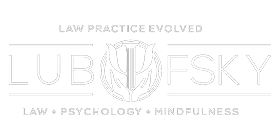Most civil litigation whether divorce, employment, business-related, etc., involves at its core a claim by one party that the opposing party failed to conform his/her/its behavior to a certain expected standard of the aggrieved party. Since so much civil litigation involves parties with some preexisting level of familiarity with opposing parties, there is usually some ego investment in the relationship between the litigants. Because this ego investment is so often intertwined with one’s “self-concept,” civil litigation tends to elicit defensive and reactive behavior patterns that serve to significantly cloud decision-making.
Mindfulness can serve as a powerful antidote to these often unhelpful reactions springing from conditioned thought. In cultivating a heightened ability to more meaningfully connect with present-moment experience (as opposed to having this experience hijacked by thoughts, judgments and expectations about this experience) clients become more likely to discover a sense of inner wisdom far more open to solutions and approaches obscured while ensnared in habitual reactive patterns.
Clients often will approach an attorney in an initial consultation by clearly stating that “I know what I want.” What he or she is often unaware of, however, is that in the absence of mindfulness, what he or she is likely articulating is likely to be ego-driven needs to “be right,” “take the high road,” not to be deprived of what I am due,” etc. The attorney is likely to be instructed to obtain this articulated result for the client, and will embark on a course of action borne of the attorney’s conceived strategy which, by definition, is deprived of any real sense of the intricacies of the relationship between the parties. Unfortunately, it is often within these intricacies that optimal solutions and approached can be found, and the client is in the best position to access these solutions through the cultivation of mindful attention to his or her present-moment experience.
In holistic law, the attorney works closely with the client to heighten his or her consciousness in a way that is conducive to identification of optimal solutions and approaches. Without this process – usually ignored by traditional law practice – the likely best case scenario outcome will be some short-term sense of vindication and/or financial compensation that will soon leave the client feeling unsatisfied. In the process, the attorney has missed an opportunity to provide lasting, sometimes transformational, solutions to the client.
To learn more about holistic law practice, call Michael Lubofsky, Esq. at (415) 508-6263, or visit http://www.Holistic-Lawyer.com.
